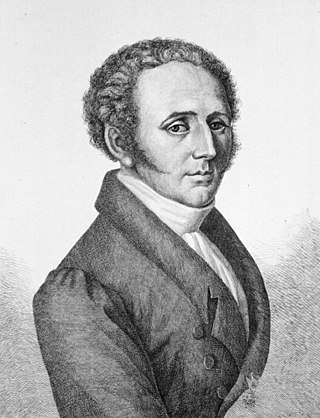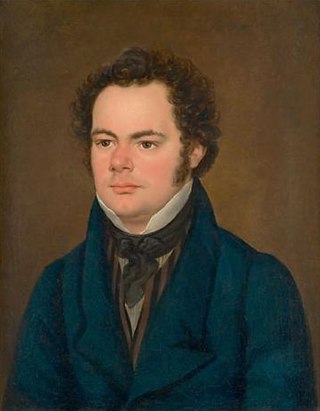
Friedrich Heinrich Karl de la Motte, Baron Fouqué ; was a German writer of the Romantic style.

Johann Michael Bach was a German composer of the Baroque period. He was the brother of Johann Christoph Bach, as well as first cousin, once removed and father-in-law of Johann Sebastian Bach. He is sometimes referred to as the "Gehrener Bach" to distinguish him from the "Wuppertaler Bach", Johann Michael Bach (1745–1820).

Alfred Mombert was a German poet.

Konrad Johann Martin Langenbeck was a German surgeon, ophthalmologist and anatomist who was a native of Horneburg.

Julia Thurnau is a French-German fine artist and actress. She is working in the field of fine arts as a part of the collective ClaudeHilde as such she developed the social Sculpture "artist at work" together with Margarita Breitkreiz for the Volksbuehne am Rosa-Luxemburg Platz in Berlin in 2023.

Herbert Fux was an Austrian film actor and politician. He appeared in more than 140 films between 1960 and 2007.

Karl Ritter was a German diplomat during the Third Reich and was convicted as a war criminal in the Ministries Trial. A member of the Nazi Party, he was ambassador to Brazil for two years, Special Envoy to the Munich Agreement, and a senior official in the Foreign Office during World War II.

Jürgen Ludwig Drews is a German Schlager singer.
Johann Michael Bach was a German composer, lawyer and music theorist.
Peter Agricola was a German Renaissance humanist, educator, classical scholar and theologian, diplomat and statesman, disciple of Martin Luther, friend and collaborator of Philipp Melanchthon.

Der Handschuh is a composition by Graham Waterhouse. He wrote the setting of Friedrich Schiller's ballad for cello and speaking voice in 2005. It was published in 2007 in Heinrichshofen's Verlag.
Friedrich Heinrich Ferdinand Leopold von Forcade de Biaix, aka Heinrich Friedrich Ferdinand Leopold von Forcade de Biaix, aka Friedrich Heinrich Ferdinand Leopold Marquis de Forcade de Biaix, was a Royal Prussian lieutenant colonel. He served in the Prussian Army from 1761 to 1793. His last command was as commanding officer of the 10th Prussian Fusilier Battalion, with which he served in the Rhine Campaigns of 1791, where he was awarded the Kingdom of Prussia's highest military order of merit for heroism, Knight of the Order of Pour le Mérite (1791). He left the Prussian Army after 32 years of service in 1793 as the result of invalidity. At the time of his death, he was the owner of Schleibitz Manor, near Oels, Silesia.
Friedrich Wilhelm von Forcade de Biaix, aka Frideric Guillaume de Forcade was a Royal Prussian Colonel, Schwadronschef of the 2nd Grenadier Company in the 24th Prussian Infantry Regiment, recipient of the Kingdom of Prussia's highest military order of merit for heroism, Knight of the Order of Pour le Mérite (1774), Commandant of Frankfurt/Oder, and Presbyter of the French congregation of Frankfurt/Oder.
Franz Schubert's best-known music for the theatre is his incidental music for Rosamunde. Less successful were his many opera and Singspiel projects. On the other hand, some of his most popular Lieder, like "Gretchen am Spinnrade," were based on texts written for the theatre.

Franz Schubert's best known song cycles, like Die schöne Müllerin and Winterreise are based on separate poems with a common theme and narrative. Other song cycles are based on consecutive excerpts of the same literary work: Schubert's "Ave Maria" is part of such a song cycle based on excerpts of the same poem, in this case by Walter Scott.

Maximilian Simonischek is a German-born Swiss actor. He is the son of the actors Peter Simonischek and Charlotte Schwab.

The Carpentras Stele is a stele found at Carpentras in southern France in 1704 that contains the first published inscription written in the Phoenician alphabet, and the first ever identified as Aramaic. It remains in Carpentras, at the Bibliothèque Inguimbertine, in a "dark corner" on the first floor. Older Aramaic texts were found since the 9th century BC, but this one is the first Aramaic text to be published in Europe. It is known as KAI 269, CIS II 141 and TAD C20.5.

Andrea I Thopia died in 1342 in Naples was an Albanian nobleman. In 1338 he inherited the county of Mat from his predecessor Tanusio Thopia.

Balladenjahr refers to the year 1797 in the history of German literature, in which many of the best-known ballads of Johann Wolfgang von Goethe and Friedrich Schiller originated within a few months, such as Goethe's "Der Zauberlehrling" and Schiller's "Der Ring des Polykrates", "Der Taucher", "Der Handschuh", "Der Gang nach dem Eisenhammer", "Ritter Toggenburg", and "Die Kraniche des Ibykus".















